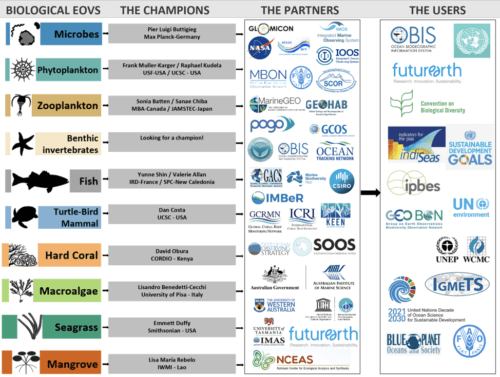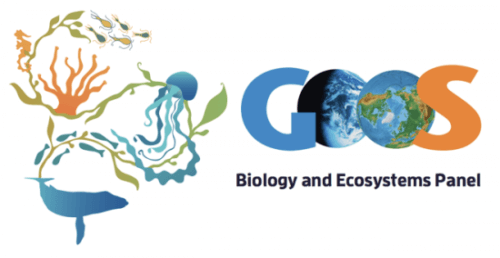Keeping an eye on the world’s oceans: designing a global ocean observing system to monitor marine life
Human societies around the world rely on the kaleidoscope of life inhabiting the global oceans. Marine species provide food, store carbon, protect coastlines, and support livelihoods – all vital services to people around the world. Yet, a rapidly changing climate, non-sustainable resource extraction, pollution, and habitat degradation are threatening the productivity and health of our world’s oceans. These changes affect life in the sea, impacting the ocean’s ability to provide essential ecosystem services. In order to understand how marine life is responding to human impacts the world we need continuous observations of marine biodiversity over time. Then these long-term observations must be combined from various locations around the world to develop a holistic, integrated picture of the status and trends of our world’s oceans.
This is exactly what the PEGASuS: Ocean Sustainability working group,Designing the observing system for the world’s ocean – from microbes to whales,is working hard to achieve. If you have ever peered out across the ocean and wondered what lives beneath its aqueous expanse, then you have a sense of the challenge the working group team is hoping to address. The working group is part of a long-term effort to integrate ocean observation and monitoring networks around the world to develop a global image of marine life.
In March, a transdisciplinary team led by Nic Bax, Daniel Dunn, and Patricia Miloslavich and comprised of scientists, policymakers, and conservationists began working to develop the foundation for the global ocean observing system to assess marine biodiversity throughout the world. This biological observing system will coordinate measurements on biological characteristics of the ocean, known as the “biological essential ocean variables” previously identified by the Global Ocean Observing System of the Intergovernmental Oceanographic Commission of UNESCO. These essential ocean variables consist of measurements on the extent and diversity of essential living habitats, such as seagrasses, mangroves, and macroalgae, and the biomass, abundance, and distribution of various categories of key marine life, such as phytoplankton, fish, turtles, and mammals. These essential biological variables were selected based on ocean observing needs identified in numerous global environmental agreements, current monitoring capabilities, and their relevance to broader scientific and societal goals.
By coordinating measurements focused on these essential biological ocean variables we can begin to paint a more holistic picture of life in the sea, from the tiniest microbes to the largest whales. This comprehensive picture will illustrate how biological communities are changing around the world and will help to illuminate the factors that contribute to dramatic changes in global marine biodiversity. In this way, a global biological ocean observing system will contribute significantly to solutions-oriented research and to the development of indicators to measure progress toward key targets proposed in international agreements, such as the Sustainable Development Goals and the Convention on Biological Diversity. In addition, the development of a global marine biodiversity observing system directly aligns with the United Nations Decade of Ocean Science for Sustainability by advancing integrated ocean observations, expanding data collection, and promoting data sharing around the world. This will assist with developing an inventory of ocean resources, forecasting changes in essential ecosystem services, such as the provisioning of food from marine resources, to enhance their sustainable use, and better understanding the impacts of ocean warming, acidification and habitat destruction on marine ecosystems.
As the wave of momentum builds around international efforts such as the United Nations Decade of Ocean Science for Sustainability, a marine biodiversity observing system is urgently needed to keep an eye on our precious marine resources and to address the complex, interconnected global marine challenges we face today. As we paint a more holistic picture of life in the sea, we can begin to turn the tide of ocean narratives toward solutions that foster increased ocean resilience and the sustainable use of our invaluable ocean resources. In this way, we can help our oceans flourish, thus ensuring the prosperity of future generations.

The PEGASuS Ocean Sustainability working group, Designing the observing system for the world’s ocean – from microbes to whales is co-chaired by Nic Bax, Daniel Dunn and Patricia Miloslavich.
PEGASuS: Ocean Sustainability is a partnership between Future Earth and the National Ecological Analysis and Synthesis Center (NCEAS) at UC Santa Barbara. PEGASuS is funded in part by the Gordon and Betty Moore Foundation’s Science Program and the NOMIS Foundation. PEGASuS is jointly administered by Future Earth and Colorado State University’s Global Biodiversity Center.


DATE
April 23, 2019AUTHOR
Erin SatterthwaiteSHARE WITH YOUR NETWORK
RELATED POSTS
Future Earth Members Join UN Ocean Conference in Barcelona
SOLAS Researchers Publish Special Feature on Air-Sea Interface in Changing Climate
Building a Knowledge Action Network In the Indigenous Communities of the South Pacific